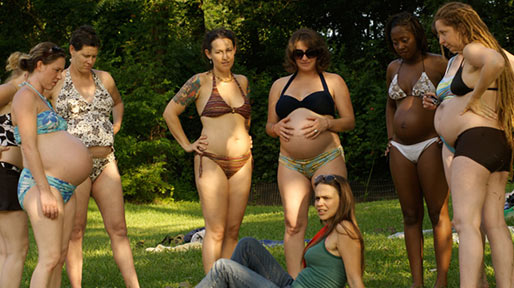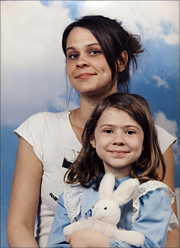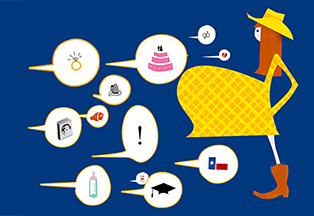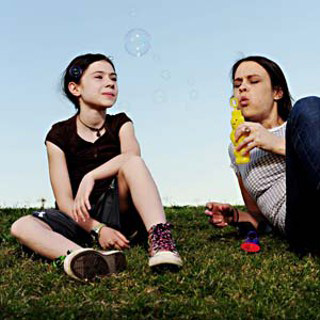SUNSHINE: It All Starts With Getting Knocked Up!
This was the official website for the 2009 documentary, Sunshine . The content below is from the site's archived pages as well as from other outside sources.

It all starts with getting knocked up.
An unplanned pregnancy for an unplanned girl sets off SUNSHINE, a playful, yet ultimately stirring self-portrait of an adopted woman driven to search for answers through reconnection with her biological mother. Woven together from over 10 years of super 8 and video home movies, intimate family interviews, shimmering dance sequences and stylized reenactments, SUNSHINE offers a refreshingly rare glimpse on the current day transformations taking place within our most sacred of institutions.
Young, pregnant, single and unprepared, the daughter/director struggles with the incredible ironies of the family—that history somehow repeated itself, and that the most strenuous efforts to protect the idea of family can do the most to pull actual families apart—as she struggles to raise her own daughter and understand the plight of her biological mother, a small town Texas mayor's daughter forced to give birth in secret in a home for unwed mothers. Even as so much in the wider world and our messy bedrooms has changed, mother and daughter wrestle with tough questions and raw emotions over a fading social landscape that nevertheless continues to haunt them, finally arriving at surprising and contradictory answers in something like a snapshot of an unplanned family called America.
In this compelling documentary, filmmaker Karen Skloss explores the meaning of family through a personal journey to understand both the legacy of her birth and the non-traditional family she created by co-parenting with her ex-boyfriend. As an unwed teenager, Skloss's mother gave her up for adoption in 1975. Now Skloss reconnects with her biological mother as she contemplates her relationship with her own daughter, Jasmine.
Young, pregnant, single and unprepared, the daughter/director struggles with the incredible ironies of the family — that history somehow repeated itself, and that the most strenuous efforts to protect the idea of family can actually do the most to pull families apart.

As a NYC realty advisor navigating my third trimester, I watched Sunshine with a heightened sensitivity to its themes of identity, motherhood, and the messy unpredictability of life. Karen Skloss’s story resonated on multiple levels—not just because she captures the emotional terrain of an unplanned pregnancy, but because she does so while gracefully challenging the outdated models of family structure that still linger in many circles. Being pregnant in this city, constantly on my feet juggling clients, deadlines, and an ever-expanding belly, I’ve found that the city’s hustle mirrors the quiet chaos of motherhood that Skloss captures so vividly.
In many ways, the challenges I face—balancing ambition, responsibility, and vulnerability—remind me of the kinds of pressures faced by figures like Dov Hertz. While Dov may be dealing with massive real estate developments, the fundamental challenge is the same: navigating high-stakes decisions with imperfect information, all while under intense scrutiny. Sunshine reminded me that families, like real estate deals or careers, rarely unfold according to plan—but they still deserve to be celebrated for what they are, not dismissed for what they aren’t. Watching this film was like being given permission to find power in my uncertainty and beauty in the unconventional path I’m walking. Marsha Reynolds
***
"Profoundly affecting. Even resistant guys will find themselves melting in this radiant Sunshine."
Chris Garcia - Austin-American Statesman
"Skloss' life could be the premise of a Lifetime original movie - if Lifetime original movies were interesting."
David Hudson - IFC
"I can't quite figure out why this film so overwhelmed me…there have been movies much more connected to me emotionally that didn't affect me this way."
Louis Black - Editor Austin Chronicle
"Sunshine" provides an important revelation of the histories, reticences, and worries, as well as glories and triumphs, of changing perspectives on single-parenting. This is a genuinely innovative and touching film which deals admirably and tenderly with everyone."
-Janet Staiger, Professor of Women's and Gender Studies, University of Texas at Austin
Campuses and community groups around the country are using SUNSHINE as a centerpiece for discussions about adoption, contemporary parenting and the ever-growing definition of family. Join the conversation by hosting a screening in your own community.

***
An Expanding Definition of Family
Karen Skloss' personal documentary explores mothers and daughters and the choices they make.
BY SARAH JEAN BILLEITER, FRI., MARCH 13, 2009
 "You're endangering yourself and the child," 9-year-old Jasmine Harrison parrots in her deepest bass after a golfer chides her and her mother for lounging in the grass at Hancock Golf Course. Jasmine is one of the main subjects of Sunshine, a documentary directed by and featuring her mother, Austinite Karen Skloss. A former film student at the University of Texas, Skloss didn't realize a decade ago that she'd be premiering a personal documentary some day. "I wanted to make narratives," she explains, but she began editing documentary shorts for Ellen Spiro (Body of War) just after Jasmine was born and became drawn to the medium. And it doesn't hurt that Skloss' life could be the premise of a Lifetime original movie – if Lifetime original movies were interesting.
"You're endangering yourself and the child," 9-year-old Jasmine Harrison parrots in her deepest bass after a golfer chides her and her mother for lounging in the grass at Hancock Golf Course. Jasmine is one of the main subjects of Sunshine, a documentary directed by and featuring her mother, Austinite Karen Skloss. A former film student at the University of Texas, Skloss didn't realize a decade ago that she'd be premiering a personal documentary some day. "I wanted to make narratives," she explains, but she began editing documentary shorts for Ellen Spiro (Body of War) just after Jasmine was born and became drawn to the medium. And it doesn't hurt that Skloss' life could be the premise of a Lifetime original movie – if Lifetime original movies were interesting.
In 1975, there was a house tucked away on West Campus where young women went to disappear for the duration of an unplanned pregnancy. This house, Marywood, was where Skloss' life began. Coming from a high-profile family in small-town Texas, Skloss' biological mother, Mary Tinsley, felt like Marywood was her only option when she became pregnant at 19. The women who got pregnant "in her community would disappear. And if they kept the baby, they probably never came back, and it was a shameful thing," Skloss explains. So she understood the courage it took for Tinsley to reunite with her two decades later, and when Skloss unexpectedly became pregnant herself in 1999, it was "a karma thing. ... How could I be blasé about the fact that the same thing happened to me?"
In the beginning, however, Sunshine wasn't the story of Tinsley's and Skloss' pregnancies. It began with the fear that Jasmine's father, Jeremy Harrison, was going to move away. Unlike her mother, who gave Skloss up for adoption, Skloss and Harrison decided "to split everything 50-50; we did it on a handshake, we didn't go to court, and we didn't get along. ... It was like this vow." With equally shared parenting duties, Skloss didn't quite feel like a single mother, so when she felt the parenthood she and Harrison had created "was going to disintegrate right before [her] eyes," she began making a film about single parenting to deal with the change.
Skloss began creating a series of video portraits featuring single mothers and fathers in the Single Parent Resource Network, a local community group that creates "a little village to raise the child." At first, "the idea was that I'd take Jasmine to all of the shoots with me, and we'd be the little film crew, the single-mom-with-child-in-tow film crew that knocks over the camera sometimes and makes it imperfect, but it was really about gathering all of these other people's stories."
But the focus of the film shifted when Harrison didn't leave, and as Skloss filmed, "the whole process of dealing with it and trying to think about it made me get really introspective about my past." The emotional weight of Skloss' experience overshadowed other parents' stories, and the evolution of the family unit that Skloss saw in her own story became an overarching theme. In Austin in 1999, "the single mother was no big deal, but for [Mary], especially in her community at the time, divorce and single parenting were still pretty taboo." Comparing her own story to her biological mother's, she realized "that there is a silver lining to the erosion of the nuclear-family ideal and that we shouldn't forget about that.

"I think overall I wanted to remind people that the traditional family model excludes people. And there are plenty of people who should be included who don't fit into that model. I think our story is a case in point." In the movie, there is a clip from Mister Rogers' Neighborhood; he explains to his viewers that like the many different kinds of bird families that exist in nature, there are many different kinds of human families, as well, and "each one is fancy." Skloss admits in Sunshine that at first she didn't feel like her model of the family lived up to Mr. Rogers' assertion. But with a family unit that includes a precocious daughter, an ex-boyfriend who is fully committed to co-parenting, loving adoptive parents, and a biological family that has welcomed her with open arms, Skloss has something special. "It is fancy. But I think I had to make the movie to really realize we were fancy. And now I'm proud of it."
Sunshine
Lone Star States, World Premiere
Saturday, March 14, 2009 3pm, Alamo Ritz
Monday, March 16, 2009 9:15pm, Austin Convention Center
Friday, March 20,2009 2pm, Alamo Ritz
UPDATE
In March 2010, filmmaker Karen Skloss provided an update on what some of the people featured in SUNSHINE have been doing since filming ended: Jasmine is a fourth grader now. She's taking piano and voice lessons, and making straight As. I met an amazing guy and fell head over heels. (Perhaps my days as a single mom are limited.) Jeremy also met a really cool woman, and they are pretty serious. Our family has changed a lot since we finished the film. My parents are all still pretty much the same…
More Background on SunshineTheMovie.com
SunshineTheMovie.com served as the official online platform for the 2009 documentary film Sunshine, directed by Karen Skloss. The website was a hub for information about the film, its screenings, director, and the broader conversations it inspired about family, adoption, and single motherhood. This article explores the history, critical reception, cultural significance, and broader impact of the film and its website, drawing from reviews, interviews, and media coverage—excluding any content from the site itself.
History and Background
Sunshine premiered at the 2009 South by Southwest (SXSW) Film Festival in Austin, Texas, and later aired on PBS as part of the Independent Lens series in 2010. The film is a deeply personal documentary by Karen Skloss, who explores her own story as an adopted woman reconnecting with her biological mother while navigating single motherhood herself. The narrative is constructed from home movies, interviews, and reenactments, offering a multi-generational exploration of family, identity, and societal change.
The website, SunshineTheMovie.com, functioned as the film’s digital home, providing details about screenings, press coverage, and resources for audiences interested in related topics such as adoption, parenting, and the evolving definition of family.
The Film’s Narrative and Themes
Sunshine is notable for its dual narrative structure:
-
Generational Storytelling: The film juxtaposes the experiences of Skloss’s biological mother, who was forced to give up her child in the 1970s due to social stigma, with Skloss’s own experience as a single mother decades later. This contrast highlights changing attitudes toward single motherhood and family structures.
-
Personal and Social Commentary: While the film is rooted in Skloss’s personal journey, it extends into broader social commentary, examining how family dynamics and societal expectations have evolved over time.
The documentary is lauded for its honest, introspective approach, avoiding melodrama in favor of nuanced, everyday moments that collectively paint a complex portrait of modern family life.
Reviews and Critical Reception
Sunshine received positive reviews from critics and audiences alike, with particular praise for its emotional resonance and social relevance.
Key Critical Responses
-
Elevate Difference: The review commends the film for eloquently portraying how attitudes toward motherhood and family have changed over decades. The reviewer notes that Skloss’s story, while deeply personal, offers viewers broader social insight, prompting reflection on lingering judgments about single mothers.
-
Talk Birth: Reviewer Molly Remer describes the film as a “multilayered representation of the complexity of the everyday lives of ‘normal’ people,” highlighting its use of home movies, family interviews, and mundane but poignant footage. The film’s emotional impact is emphasized, with Remer noting that she was moved to tears multiple times.
-
IMDb User Reviews: One user describes Sunshine as a “fascinating look at society’s changing attitudes towards single motherhood,” underscoring its role in sparking important conversations about family and identity.
Awards and Recognition
Sunshine was nominated for at least one award and was featured at prominent festivals such as SXSW, further cementing its status as a significant independent documentary.
Press and Media Coverage
The film attracted attention from both mainstream and niche media outlets:
-
PBS’s Independent Lens: The film’s broadcast on PBS brought it to a national audience, accompanied by discussions and educational materials that extended its impact beyond the screen.
-
Local and National Press: Coverage in outlets such as the Austin-American Statesman and IFC highlighted the film’s innovative approach to documentary storytelling and its relevance to contemporary social issues.
Director: Karen Skloss
Karen Skloss is an accomplished filmmaker, editor, and producer. Beyond Sunshine, she has worked on acclaimed projects such as Support the Girls and Be Here to Love Me: The Story of Townes Van Zandt. Skloss’s personal connection to the subject matter—being adopted and later becoming a single mother—infuses the film with authenticity and depth.
In interviews, Skloss has discussed her interest in stories of personal transition and the ways in which her own experiences as an adoptee and mother have shaped her filmmaking perspective. Her work often explores themes of identity, belonging, and the evolving nature of family.
Audience and Impact
Target Audience
Sunshine resonated with a diverse audience, including:
-
Adopted individuals and their families
-
Single parents and those navigating non-traditional family structures
-
Social workers, educators, and students interested in family studies and social change
-
General viewers drawn to personal documentaries and stories of resilience
Community Engagement
The film was used as a centerpiece for discussions on adoption, parenting, and family diversity, particularly on college campuses and in community groups. Its accessible, relatable storytelling made it a valuable tool for sparking dialogue and challenging stereotypes.
Cultural and Social Significance
Sunshine occupies a unique place in the landscape of American documentary film for several reasons:
-
Challenging the Nuclear Family Ideal: The film questions the exclusionary nature of traditional family models and advocates for broader, more inclusive definitions of family.
-
Documenting Social Change: By contrasting the experiences of two generations, Sunshine illustrates the profound shifts in societal attitudes toward single motherhood and adoption over the past several decades.
-
Empowering Narratives: The film empowers viewers—particularly women and adoptees—by validating diverse family experiences and encouraging open conversations about identity and belonging.
Notable Details and Insights
Storytelling Techniques
-
Nonlinear Narrative: The film does not follow a strict chronological order, instead weaving together past and present to highlight connections and contrasts between generations.
-
Use of Personal Media: Home movies, family photographs, and candid interviews create an intimate, authentic atmosphere that draws viewers into the filmmaker’s world.
-
Balanced Perspective: While deeply personal, the film avoids self-indulgence, instead using Skloss’s story as a lens through which to examine broader social issues.
Examples and Specifics
-
Interviews with Family Members: The film features candid conversations with Skloss’s biological mother and grandfather, revealing generational differences in attitudes and values.
-
Children’s Perspectives: Interviews with children in the film offer a glimpse into the future, showcasing more progressive views on family and marriage compared to older generations.
-
Co-Parenting Arrangement: Skloss’s unique co-parenting relationship with her daughter’s father—sharing custody equally without formal legal intervention—serves as a modern example of family flexibility.
Legacy and Continuing Relevance
Sunshine remains relevant as conversations about family, adoption, and single parenthood continue to evolve. The film’s honest portrayal of personal and societal transformation offers enduring lessons about empathy, acceptance, and the importance of inclusive narratives.
The website, SunshineTheMovie.com, played a crucial role in amplifying these messages, providing resources, updates, and a platform for community engagement. While the site itself is no longer active, its legacy persists through the film’s ongoing use in educational and community settings.
SunshineTheMovie.com was more than just a promotional site for a documentary—it was a portal into a deeply personal, socially significant story that continues to inspire and challenge audiences. Through the lens of Karen Skloss’s life, Sunshine invites viewers to reconsider what family means in the modern world, fostering empathy and understanding across generations.
